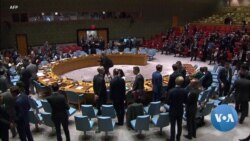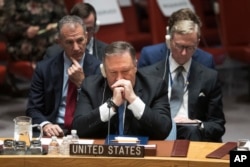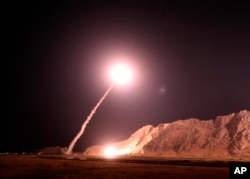U.S. Secretary of State Mike Pompeo told the U.N. Security Council Wednesday that Iran's ballistic missile activity has been growing since the 2015 nuclear deal was agreed upon, and he urged stronger restrictions to prevent such activity.
"Iran has exploited the goodwill of nations and defied multiple Security Council resolutions in its quest for a robust ballistic missile force," Pompeo told the council at its semiannual meeting to discuss the nuclear deal's implementation. "The United States will never stand for this."
WATCH: Pompeo Says Iran Increasing Ballistic Missile Activity
He noted that Security Council Resolution 2231, which enshrines the nuclear deal in international law, "calls upon" Iran not to undertake any activity related to ballistic missiles designed to be capable of delivering nuclear weapons.
"When we 'call upon' Iran to cease its ballistic missile activity, we agree it must stop now. But Iran is as defiant of the world's insistence as ever," Pompeo said. "Iran's pace of missile activity, including missile launches and tests, did not diminish since the JCPOA. In fact, Iran's missile testing and missile proliferation is growing," he said, referring to the nuclear deal by its acronym.
Largest missile force
Pompeo alleged that Iran has the largest ballistic missile force in the Middle East, with more than 10 ballistic missile systems in its inventory or in development. According to Iranian officials, some of their missiles can travel up to 2,000 kilometers, a distance, Pompeo said, that could put European allies in places like Athens, Sofia and Bucharest in harm's way.
The secretary of state said the U.S. wants to work with the Security Council's other 14 members to reimpose tougher ballistic missile restrictions that were contained in an earlier council resolution. The resolution he referred to forbids Tehran from undertaking any activity related to ballistic missiles capable of delivering nuclear weapons.
Under the 2015 nuclear deal, the five permanent members of the U.N. Security Council (Britain, China, France, Russia and the United States) plus Germany agreed with Iran to lift economic sanctions in exchange for Tehran's limiting its nuclear activities and allowing in international inspectors.
Iran has always said that its nuclear program was for purely peaceful purposes.
Since the deal was implemented, the International Atomic Energy Agency has repeatedly verified that Iran is upholding its commitments.
President Donald Trump deemed the Obama-era deal "a disaster" and withdrew the U.S. from it in May. In November, his administration unilaterally reimposed economic sanctions on Iran.
Condemnation of U.S. urged
"The council should strongly condemn the U.S. for reimposing its illegal sanctions against Iranians in violation of the U.N. Charter and international law," said Iran's deputy U.N. ambassador, Eshagh al-Habib.
Washington's European allies remain in the nuclear deal and reaffirmed their commitment to it at Wednesday's meeting.
"We believe that the JCPOA is a very important contribution to the global non-proliferation architecture," said Germany's U.N. ambassador, Christoph Heusgen. "It is an important asset for the security of the region and for the security of Europe, and this is our key interest." He said as long as Tehran complies with the deal, Europe will make sure Tehran continues to benefit from it.
Destabilizing behavior
Tehran has acknowledged test-firing a medium-range ballistic missile on Dec. 1. Many council members criticized the test as being "inconsistent" with Resolution 2231. The United States has said it is a violation.
"Iran has been on a testing spree and a proliferation spree, and this must come to an end," Pompeo told reporters after the meeting. "This threat is real and upon us."
Most council members expressed concern about Iran's destabilizing activities in the region — including in Syria, Yemen, Iraq and Lebanon — but they want that addressed separately from the nuclear deal.








